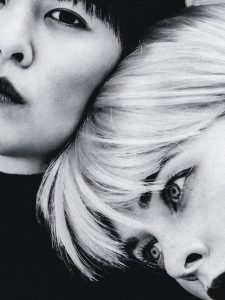Hurtful Relationship Patterns and Deep Dreams

By Agnieszka Olszewska–Kaczmarek
In everyday life, we often meet people who are in relationships that bring them more suffering than benefits. One of the parties, despite repeated injuries and a sense of unfulfillment and even unhappiness, remains in the relationship or walks away just to return in a moment.
 On the other side is a partner who is addicted, notoriously fails to keep promises, and may even commit physical or psychological violence. This partner may also cheat, mentally humiliate, and rarely if ever appreciate the other partner.
On the other side is a partner who is addicted, notoriously fails to keep promises, and may even commit physical or psychological violence. This partner may also cheat, mentally humiliate, and rarely if ever appreciate the other partner.
Gender Norms can Contribute to Disfunction
Gender configurations are changing and the hurtful behaviors themselves can be further strengthened by cultural patterns defining what is okay, acceptable and even desirable in the behavior of a woman or a man and what is absolutely “not appropriate”.
Entanglement can also take the form of constantly waiting for someone who is unreachable or returning in memories to someone who passed away many years earlier. Looking at such an image from some distance, we wonder how this is possible.
The Relationship High Dream
Of course, there are many reasons for such pattern developments: the family home, economic dependence, low self-esteem, cultural messages, lack of contact with one’s own feelings and needs, guilt etc. One of the elements of this puzzle, to which Processwork draws attention, is the high dream (a term coined by the founder of the method, Dr Arnold Mindell).
Simply put, in the context of relationships, this is our deepest vision of the desired relationship. Each and every one of us has our own unique version of such a dream relationship. For one person, it will be a constant mutual motivation for development; many hours of intellectual discussions and trips to the mountains. For another, raising children together and mutual daily care.
Someone may dream of emotional quarrels followed by equally fiery sexual intercourse. There are as many relationship high dreams as there are people in the world, and each of these dreams is a complex mosaic of behaviors, features and moods that we deeply desire.
The High Dream Points to Our Deepest Needs
A high dream is connected with our deepest needs, which is why it is an integral part of ourselves, and it demands fulfillment. When we fall in love, we often attribute the object of our feelings with the characteristics of our dream.
Someone has a strong presence or personality or dream figure and we associate it with care and providing us with a sense of security. Someone else smiles impishly and we can already see through our imagination how we run together lightly in a meadow away from all the world’s problems. We get gifts or compliments and we are filled with a sense of importance and uniqueness.
In some relationships the bond deepens over time, in others the initial incentives disappear in the face of disproportionately more frequent injuries. The need for love, the desire to fulfill the deep dream that we carry in the middle of our soul can cause us to persistently stick to the person with whom our dream emerged.
Exaggerating the Positive
We focus excessive attention on a positive event, exaggerating its significance, while ignoring a whole series of negative experiences. We consciously or unconsciously choose to ignore, overlook or rationalize obvious red flags. A bouquet of flowers given in the morning cancels another multi-day drinking binge. A nice text message annuls weeks
of silence. It may also be that there is nothing good any more, but we believe that if we try harder, the dream will come true.
Therapy Using the High Dream
Therapy can help you explore relationship high dreams and get closer to their realization. In the process of building a satisfying life, it is often important to stand firmly and embrace our high dream. If we fully recognize that we deserve good experiences, it is easier for us to consciously assess whether what we desire really happens in reality.
On this path we will probably meet beliefs that stand in opposition to our high dream: “There are no such sensitive men.” “I’m too old.” “The role of a woman is to sacrifice,” etc.
Memories of negative experiences from our first relationships with caretakers may come back. The therapeutic process helps heal old wounds and build new, favorable mental, emotional and psychological patterns.
Embodying our own High Dream
At the same time, and sometimes surprisingly so, we discover many of these beautiful features that we attribute to others are parts of ourselves. These areas are ones that have long demanded to come to our awareness. In this way, we also become a fulfilled dream about ourselves.
By Agnieszka Olszewska–Kaczmarek, MA, MAPOF
Agnieszka Olszewska – Kaczmarek is a psychologist and psychotherapist. She completed her master’s in Processwork at the Process Work Institute in 2020. She lives in Poland and works in a psychiatric hospital for children and teenagers and at the Center For Women Rights and has a private practice. Agnieszka is also a singer-songwriter, performing under her stage name Back To The Ocean.
Learn more about Agnieszka’s therapy practice:
https://agnieszkatherapy.webnode.com
https://www.facebook.com/AgnieszkaOK.ProcessWork
And hear some of her music:
https://www.reverbnation.com/backtotheocean
This article first appeared in Polish at Psycheexpert.pl on 4/23/20. This English version was edited by MaryJo Radosevich, MBA.
Photo Credit: Maria Orlova https://www.pexels.com/photo/young-multiracial-women-leaning-to-each-other-4906336/

